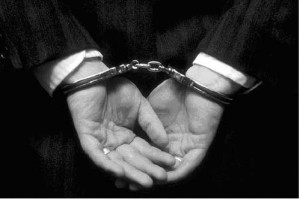Expecting arrest for non-filing of tax return?
 If you have failed to file your income tax return by the end of the assessment year without any genuine ground for failing to do so, you can expect to get arrested by the Income Tax Department for prosecution under section 276CC of the Income Tax Act. You might be sentenced to a rigorous imprisonment along with fine for non-filing of tax return.
If you have failed to file your income tax return by the end of the assessment year without any genuine ground for failing to do so, you can expect to get arrested by the Income Tax Department for prosecution under section 276CC of the Income Tax Act. You might be sentenced to a rigorous imprisonment along with fine for non-filing of tax return.
Provisions of section 139(1) of the Income Tax Act, 1961:
Section 139(1) of The Income Tax Act, 1961, provides that if any person having a total income amounting to more than the maximum amount which is not chargeable to tax in the previous year, should file his return of income within the due date relevant for the assessment year.
Often assesses having taxable income avoid filing of return of income either on genuine grounds or willfully and engages themselves in evasion of income tax.
Provisions for Prosecution Proceedings under section 276CC:
The provision of section 276CC of the Act deals with prosecution proceedings against the defaulting assessee, and provides punishment which extends up to imprisonment and fine.
The section provides that if a person willfully fails to furnish his return within due time, he shall be punished —
(a) Where the amount of tax is more than rupees twenty five hundred thousand, with rigorous imprisonment for a term ranging from six months to seven years and with fine;
(b) In any other case, with imprisonment for a term ranging from three months to three years along with fine.
Circumstances where prosecution proceedings under section 276CC be initiated:
The law penalizes the defaulting assessees for failure in furnishing timely return of income, only in cases where the default is willful irrespective of the amount of tax evaded by them through non-filing of return.
Ingredients of imposing the penal provisions under section 276CC:
The presence of the following two ingredients is necessary for initiating prosecution proceedings under section 276CC –
(1) Deliberate delay in furnishing income tax return;
(2) Ill motive of the assessee to evade tax.
Is willful delay in filing return of income essential for initiating prosecution proceedings under section 276CC?
The provisions of sec 276CC indicate willful intention on part of the assessee to escape from tax liability under the Act.
While initiating the prosecution proceedings under this section, it is mandatory to establish the ill intention on part of the assessee to evade tax through non-filing of return.
How the intention of the assessee can be established?
The willful intention on part of the assessee must be established with sound evidences corroborating the fact that there is no ground for the delay in furnishing of return on part of the assessee.
The judgment given by the Hon’ble High Court of Madhya Pradesh in Bhavecha Machinery vs. Union of India [2010] 320 ITR 263 (MP), provides the requirements for initiating prosecution proceedings under this section. It stated that to constitute an offence under section 276CC, the failure to file the return must be ‘willful’ and there should be no doubt arising from them.
Can an Assessing Officer initiate the prosecution proceedings merely based on his presumption?
Mere presumption of the Assessing Officer without any evidence cannot be a valid reason for initiating the prosecution proceedings under section 276CC.


 ITAT Amritsar: No Section 269SS Violation for One-Time Cash Payment Before Sub-Registrar
ITAT Amritsar: No Section 269SS Violation for One-Time Cash Payment Before Sub-Registrar  Tax Officials Unleash Digital Dragnet: How New Raid Powers Redefine Privacy, Property Rights in India and likely to Fuel Corruption
Tax Officials Unleash Digital Dragnet: How New Raid Powers Redefine Privacy, Property Rights in India and likely to Fuel Corruption  Income Tax Department Rewards for Reporting Tax Evasion: A Comprehensive Guide
Income Tax Department Rewards for Reporting Tax Evasion: A Comprehensive Guide  Forfeiture of Gratuity by Employer- What are the Remedies for an employee- Can employer be challenged?
Forfeiture of Gratuity by Employer- What are the Remedies for an employee- Can employer be challenged?  Employer can forfeit gratuity of an employee in case of moral turpitude
Employer can forfeit gratuity of an employee in case of moral turpitude  Diving Deeper: The Impact of the New Tax Bill on Dairy and Farming Income
Diving Deeper: The Impact of the New Tax Bill on Dairy and Farming Income